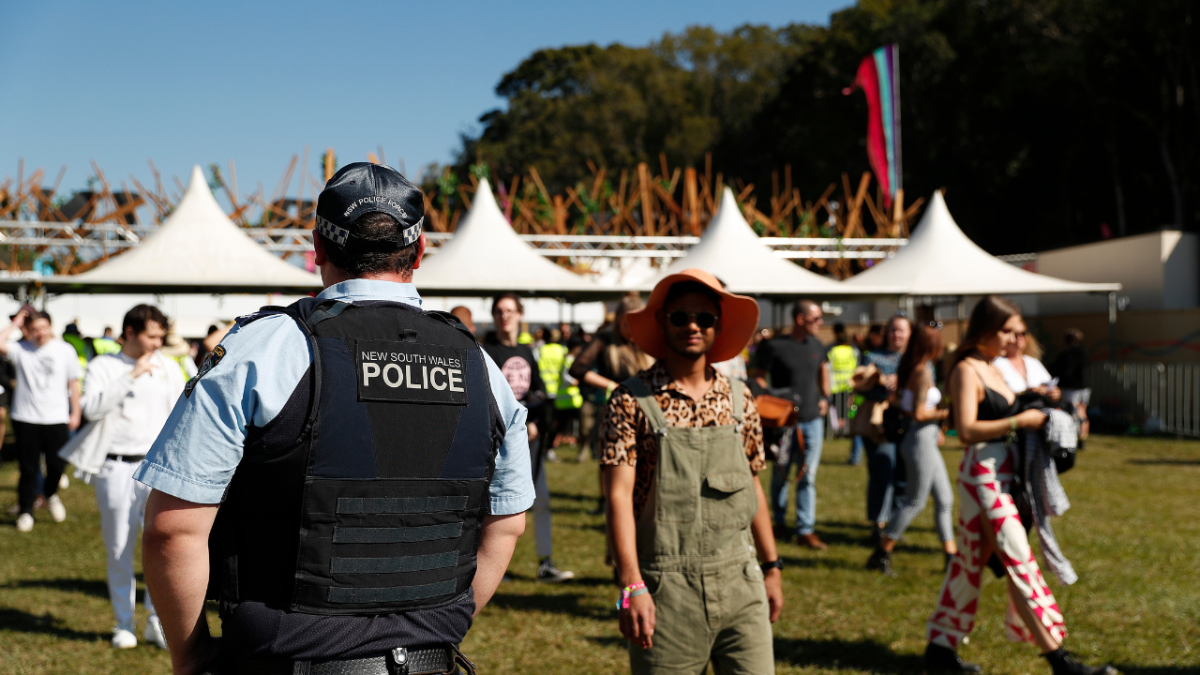
Victoria Police are often present at festivals and major events, but their little-known powers to stop and search people arbitrarily and without a warrant came to light on social media at the weekend. Here’s what you need to know about them.
Ahead of Melbourne’s Summer Camp LGBTQIA music festival on Saturday, writer and advocate Joshua Badge tweeted a public service announcement to attendees. Having read the Victorian Government Gazette, a resource that provides official notification of decisions or actions taken by government bodies, they alerted their followers that the CBD was a “designated area” on the day of the festival.
“Girlies and gays!” the tweet read.
“If you’re headed to Summer Camp today please be aware that VicPol has declared the CBD and Carlton a ‘designated area’ which means they can stop and search people without warrants.
“If you’re Aboriginal, POC, queer or trans you may want to avoid travelling through the city to and from the festival.”
The post was shared widely on social media — beyond just Melbourne’s LGBTQIA circles — with many reacting in dismay that such powers even existed.
“There wasn’t hysteria in the community, I think that most people just didn’t realise this was the case,” Badge told PEDESTRIAN.TV.
“Who’s reading the government gazette when they go out on the weekend? How is someone supposed to know that they’re in this arbitrary area at this arbitrary time where police suddenly have more power than they usually do?
“Even if someone did know their rights under normal legislation they would just be wrong on this occasion.”
Under Section 10D of Victoria’s Control and Weapons Act 1990, the police commissioner can designate a part of the state for a specified period of time where officers will have expanded powers.
The powers may vary slightly depending on the need of the area but in most cases members of the police force are authorised to stop and search anyone or anything within the area without a warrant. They can also detain a person, vehicle or item for so long as is reasonably necessary to conduct a search and can seize any item the officer reasonably suspects is a weapon.
Police also have slightly beefed up crowd control measures and can direct a person to leave the designated area if the officer reasonably believes the person is wearing the face covering primarily to conceal their identity or protect them from the effects of a crowd control substance (like pepper spray).
While all declarations must be published in the gazette in advance, Victoria Police is not required to say why it’s happening, where they’ll be or who they’ll be targeting.
The Act states a designated area must only be used when more than one incident of violence or disorder has occurred in that area in the previous 12 months that involved the use of weapons; or an event is to be held in that area and incidents of violence or disorder involving the use of weapons have occurred at previous occasions of that event. Police must also have determined there is a likelihood that the violence or disorder will recur.
PEDESTRIAN.TV sent specific questions to Victoria Police about the intention behind Saturday’s designated area, which was in place from 4pm to 4am Sunday. They refused to comment but sent a press release about a fatal stabbing on Bourke Street on October 30.
Designated areas are declared pretty frequently. They can cover huge areas of the city or be localised to a specific public area like a train station.
Most designated areas in the last 12 months have been in Melbourne’s outer suburbs, but some have also coincided with major events. PEDESTRIAN.TV identified two that happened to be on the first and final days of St Kilda Festival in February 2022 spanning the St Kilda area, and another on News Year’s Eve from 5pm on Friday 31 December 2021 to 5am on Saturday 1 January 2022 which covered the CBD and parts of East, South, West and North Melbourne.
Badge said they were personally concerned the powers could be used for drug busts.
“Even though the powers are about searching for weapons, they would still be able to prosecute for whatever else they found,” they said.
“There’s this really easy slide that happens from what these powers are in theory meant to do and how they could be used actually in practice.”
Badge also said extra measures like designated areas did nothing to improve the relationship between law enforcement and the LGBTQIA community, which has historically been over-policed.
Research by the Pride Lobby in 2021 revealed 80 per cent of LGBTQIA Victorians said they did not feel they could trust the police to use their powers reasonably, and 80 per cent also said they didn’t feel safe when there was a large police presence at community events.
“It’s certainly not building trust,” Badge said.
“What that means is when LBGTQIA people are the victims of hate crimes, hate speech, street harassment, partner violence, sexual crimes whatever it is, they won’t go to the police because they feel they’re not going to get a fair hearing.
“In general, I would say these powers are a huge overreach. The fact that the police can just declare an area at any time for essentially any reason unstated that gives them a suite of powers for effectively however long they want is just a little bit off the rails.”



